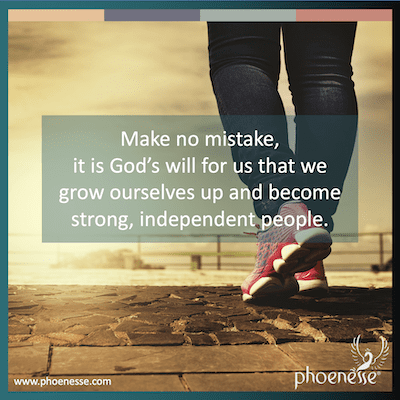
Make no mistake, it is God’s will for us that we grow ourselves up and become strong, independent people.
The forces of activity and passivity
There are many ways to slice the pie of life, but in the end, we can split the universe down the middle into two basic principles: active and passive. The kicker is to know which to apply when. For we all have free will, meaning we get to decide. But things quickly get tricky because we also have self-will, which is our little ego that wants to always have its way. And then there’s God’s will, which often has us scratching our heads: which way are we to go? Let’s sort this all out.
First off, it’s a misnomer to believe that applying our free will means to be active, and following God’s will means to be passive. No. We’ll need to use plenty of our own willpower to find and follow God’s will, a motion we often then confuse with pressing too hard on the accelerator of our self-will.
Uncrossing our wires
In general, our tendency is to be active when being passive would be the wiser choice. This is what leads to congestion, followed swiftly by frustration. Likewise, we sometimes drop into passive behavior just when being active would be better. This leads directly into stagnation.
Where we tend to get into the most trouble is when we bump into people or circumstances that are not to our liking. Sometimes, in fact, they are downright wrong! That’s when we jump into action, just when acceptance is what’s really called for. For more often than not, we are powerless to change people, places or things. And yet we press.
This pressing, pushing, forcing-type behavior is oh-so-tempting, but in the end, terribly ineffective (other than in the way it wears us out). So as the Serenity Prayer encourages, we must learn to ‘accept the things we cannot change,’ and this covers a-whole-lot-a territory. Acceptance, then, is the first step toward achieving a level of peace and serenity. It’s what we must come to first, before we can move on to making a change.
Serenity Prayer
God, grant me
The serenity to accept the things I cannot change,
The courage to change the things I can,
And the wisdom to know the difference.
Where we get tripped up is in revolting against the imperfections we encounter here in Earth-land. And while they’re everywhere, let’s be honest, imperfections aren’t just in others. They exist in each and every one of us, and in general, we are loath to look at where and how they live in us. So we routinely eye-spy the faults in others we are blind to in ourselves. Said another way, ‘you spot it, you got it.’
This inner revolt throws our emotions into high gear, hoping to fix, overcome or in some way affect what we don’t like, for the better. Thing is, life doesn’t work that way. As a result, we end up effectively—or ineffectively, as it were—pushing against an immovable stone wall, which doesn’t add an iota of order or organization to the world. In fact, this is mismanagement of our will, and it saps us of our freedom and our fuel.
If, instead, we could find a way to relax about that which we have no control over, we would miraculously find ourselves with more strength to change what we can, namely ourselves. For every unpleasant emotion—every resentment, anger or shred of anxiety—is an indication that something is amiss in us. And yet, what do we usually do? We look for who or what is to blame for our discomfort.
Seek the solution where it lives: In us
The true way out—the way to shift our emotional situation—is not to clamor on and on about what the other has done wrong, but instead to ask: “What is it that I want?” For no matter what the other has done wrong—and let’s face it, there is usually no lack of finger-pointing to go around—if we are experiencing an unpleasant emotion, there is some faulty premise in us we need to search for.
If we don’t check ourselves here and begin to look within for the source of our unrest, we’ll wrongly grind into active gear, fueled by our resentment, fear or hatred. And acting from these ill-advised desires of wanting to hurt or retaliate against someone else is a losing proposition. Any relief it creates will be temporary, and any fulfillment will be total illusion. We will end up perpetuating feelings of frustration, and in short, not helping a thing.
When we search for what we want, we need to pay attention to finding both our pure motives and our impure ones.
So this is the moment to slow down and become passive, so we can seek the solution where it lives: inside of us. Note, when we search for what we want, we need to pay attention to finding both our pure motives and our impure ones. Ironically, just the ability to surface our impure motives will have a purifying effect. Once we find them, now it’s time to apply our active efforts in examining our pressing desires and adjusting them as necessary.
This type of inner analysis is something we can do throughout the day. Every few hours, just check in and see what unpleasant emotions have bubbled up. Take the time to ask, “What do I want?” and look especially hard for conflicting answers. These are blinking lights that always indicate an immaturity in us. Chances are we want something we can’t have or aren’t willing to pay the price for.
Such search-and-find exercises will lead us to maturity. And make no mistake, it is God’s will for us that we grow ourselves up and become strong, independent people. In point of fact, we have been given the free will to run our own lives, but too often we use this freedom to run amok. When this happens, it’s on us to make a change—to grow up the immature aspects we find in ourselves—and stop pushing for other people and circumstances to change.
How to find God’s will
To be clear, our self-will is the will of our Lower Self. And its signature move is to not act in our own best interest. It’s on us, then, to dig deep and find our better-behaved free will. This can then be used to uncover inner pockets of Lower-Self resistance. This includes our wishful thinking and our self-deception. It’s our free will then that has the listening ears to tune into God’s will.
God’s will is the quiet inner voice that quite simply knows right from wrong.
God’s will isn’t actually all that hard to uncover, folks. Anyone—whether spiritual, religious or atheist—can hear it. It’s the quiet inner voice that quite simply knows right from wrong. Often, this is situated directly behind our inner blindness.
So whenever we’re willing to take the time to sort through our layers of Lower-Self rationalizations and justifications—those smokescreens designed to cover up our less-than-shiny motives—we’ll find the clear, still voice of our Higher Self just waiting to be heard. That voice and God’s voice are singing the same tune.
Our first move, then, needs to be in the direction of self-honesty. We need to muster our free will and start to make an effort. We must let God see that we mean business; God so totally appreciates a willing heart. Also, don’t forget to pray for help along the way. If we do this and our aim is true, we’ll begin to know God’s will for us. Of this, we can be sure.
Conversely, if we’d prefer to remain mired in our resistance, the sluggishness and immaturity of our Lower Self will prevail. We’ll have a foggy meter for interpreting God’s will for us and we will follow our wrong instincts in exactly the wrong direction.
How can we know which way we’re heading? Easy, by how we feel. Following God’s will brings feelings of peace and relief, along with a sense of utter rightness. When such clarity comes, it won’t be some big revelation written in the sky. Rather, it will be like an inner knowing that we are living right.
We’ll become willing to do the next right thing, which in turn will bring us closer to our highest good. And once we get right with ourselves, we’ll organically feel ourselves being right with God. What’s more, our passive forces will begin flowing in the right channels, and we will readily find ‘the courage to change the things we can.’
Most reassuring of all, we will feel support and guidance arriving from the Spirit World, sent by God in acknowledgment of our sincere good intentions. So remember, our prayers and good efforts to clean up our hidden inner fog will go a long way toward receiving clear answers, and these have the power to change our lives for the better.
And really, isn’t that what we’re all praying for?
—The Guide’s wisdom in Jill Loree’s words

Next Chapter • Return to Contents
Adapted from original Pathwork Guide Lecture #29: The Forces of Activity and Passivity – Finding God’s Will
We Can Heal | After the Ego • Blinded by Fear
Real. Clear. series | Holy Moly • Finding Gold • Bible Me This • The Pull • Pearls • Gems • Bones • Nutshells
All essays | Get a Better Boat • Living Light • Latest essays
Self. Care. series | Spilling the Script • Healing the Hurt • Doing the Work
More books | Walker • Word for Word • Spiritual Laws • Keywords



